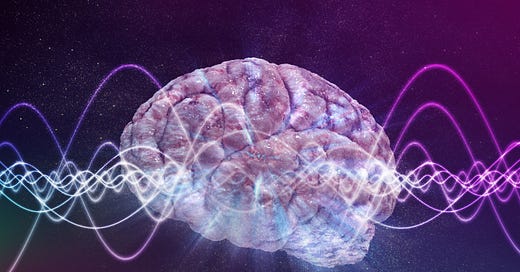Weekly Roundup: Your Brain Beats AI, Music and Universal Emotions, Change Perception and Change Stress, and Leaving a Legacy
Your weekly roundup of fascinating research into the brain, psychology, and human behaviour
Your weekly round up of all things the brain and psychology. First up some good news:
The Human Brain Beats AI
AI is in the news constantly at the moment, and likely will be for a while as these technologies advance at rapid pace and are seemingly outsmarting most of us in many fields. Not all and it has limitations - and I did write a short review a few weeks ago.
As I said, it is frightening just how good AI has become, so it is with a sense of relief that I heard of a paper which argues, and provides evidence, for the superiority of the human brain’s shallow architecture which accomplishes amazingly complex tasks.
What is shallow architecture you may ask? Well it is the opposite of what the current AI models use. They use deep architecture that means going through dozens, or hundreds, of hierarchies and layers in masses of information to spit out seemingly coherent sentences and information.
This requires masses of processing power and data analysis to reach this - as I mentioned these AI tools have been learning for years on massive databases of information. We human beings, on the contrary, do what we do with a couple of pounds of flesh which we carry around in our skull and feed a bit of energy through the food we eat. Not bad, not bad at all.
Another way to think of it is like a building or a company - AI currently operates in a model like a skyscraper, information has to pass through multiple categories and floors to get to the top, sometimes hundreds. Alternatively the brain uses shallow architecture but with filters to filter out noise and error and is like a long low flat building with only few layers getting you to the top.
Tevet et al. showed that this is more efficient and accurate than those deep learning networks. That’s one up for the brain. Yay!
The researchers also note that current hardware and chips are not suitable for these shallow processes. Still one up for the brain - however, I am sure that researchers will find a way to develop AI with shallow architecture - then it may really be time up for us mortal human beings with our biological brains.
But processing emotions is still a very human thing - and the only way to get truly human intelligence is to build a human - we’re already very good at that. I’ve helped get two up and running with reasonably good brains.
That brings me back nicely to that very human aspect of feeling emotions. And also music which generates said emotions. I have written a few articles on music recently - also being a bit of an audiophile this fascinates me. And another recent piece has tried to find how universal human emotions are to music.
The Universality of Human Responses to Music
If you watch an emotional film and take away the music, the film’s impact disappears. Film score are key aspects of creating the mood to a film and various piece of music have gone down in history becoming linked directly to the emotion and scenes in the film - think Hitchcock shower scene from Psycho, or Jaws, but also the love song from Tchaikowsky’s Romeo and Juliet.
The question though is how universal is this music? Is this an artefact of western culture and exposure to these types of music? Can universal audiences truly identify music types and do the respective bodily sensations match different cultures?
Keep reading with a 7-day free trial
Subscribe to leading brains Review to keep reading this post and get 7 days of free access to the full post archives.




